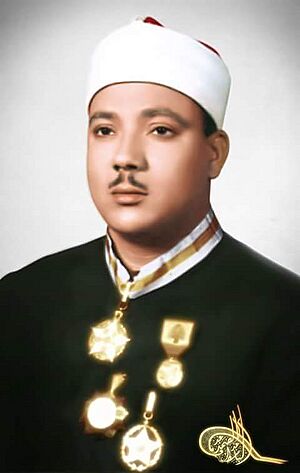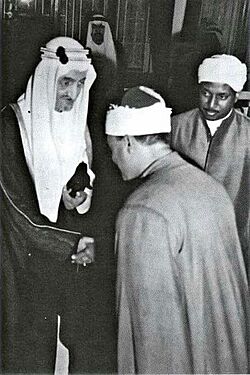Abdul Basit 'Abd us-Samad facts for kids
Quick facts for kids Abdul Basit Muhammad Abdus Samad |
|
|---|---|
| عبـدُ الباسِـط مُحـمّـد عبـدُ ٱلصّـمـد | |
 |
|
| Religion | Islam |
| Known for | His unique melodic recitation of the Quran |
| Personal | |
| Nationality | Egyptian |
| Born | 1927 Armant, Kingdom of Egypt |
| Died | 30 November 1988 (aged 60–61) Cairo, Egypt |
| Resting place | Graveyard of Mausoleum of Imam al-Shafi'i, Cairo, Egypt. |
| Children | 3 |
| Senior posting | |
| Title |
|
| Religious career | |
| Website | |
Abdul Basit 'Abd us-Samad (1927 – 30 November 1988) was a famous Egyptian Quran reciter. A reciter, or Qari, is a person who recites the Quran, the holy book of Islam. He was also a Hafiz, which means he had memorized the entire Quran.
He was one of the most important and well-known reciters of his time. Many people around the Islamic World loved to listen to him. Because of his beautiful and emotional voice, he earned the nicknames "The Golden Throat" and "Voice of Heaven". He was known for his amazing breath control, which allowed him to recite long passages of the Quran without stopping.
Contents
A Gifted Young Reciter
Abdul Basit Abdul Samad was born in 1927 in a village called Al-Maarazeh in Egypt. His family was very religious, and reciting the Quran was an important part of their lives. His grandfather and father were both skilled Quran reciters.
From a young age, Abdul Basit was dedicated to learning the Quran. When he was six, he joined his older brothers at a religious school, called a Madrasa, to memorize the holy book. His teacher quickly saw that Abdul Basit was a special student. He learned very fast and paid close attention to the correct way to pronounce every word. His teacher knew that the young boy had a great talent and a wonderful voice for recitation.
Learning the Art of Recitation
By the time he was 10 years old, Abdul Basit had memorized the entire Quran. He wanted to learn even more, so he asked his family if he could study the Qira'at. The Qira'at are the different traditional methods of reciting the Quran. His family agreed and planned to send him to the city of Tanta to study with a famous teacher named Sheikh Muhammad Salim.
Just before he was about to leave, Sheikh Muhammad Salim happened to move to a town near Abdul Basit's home. This was a wonderful surprise! Abdul Basit was able to study with the famous teacher without having to move far away. He reviewed the whole Quran with Sheikh Salim and also memorized the Al-Shatibia, an important text that explains the seven main styles of recitation.
By age 12, Abdul Basit was already becoming famous in his region. His teacher, Sheikh Salim, was so proud of him that he recommended him for recitations in many nearby towns and villages. People trusted Sheikh Salim's opinion and were eager to hear the talented young boy recite.
A Star is Born in Cairo
When Abdul Basit was 23, he moved to Cairo and his career took off. He was invited to a big celebration at the famous Sayyida Zainab Mosque. Many of the top reciters in Egypt were there, and Abdul Basit was just happy to be in the audience listening to them.
An Unforgettable Night
Late that night, a relative of Abdul Basit asked the event organizers if the young man could recite for just ten minutes. The mosque was packed with people. When Abdul Basit began to recite, the crowd was amazed. His voice was so powerful and beautiful that it captured everyone's hearts.
The audience began to shout "Allah Akbar!" ("God is the greatest!"). His ten-minute recitation was not enough for them. Every time he tried to finish, the crowd begged him to continue. He ended up reciting for nearly two hours, finishing as the sun came up. That night made him famous.
A Voice Heard on the Radio
After his amazing performance, Abdul Basit decided to apply to be a reciter on the national radio station. In 1951, he was hired, and his voice soon became known throughout Egypt and beyond. He was one of the first reciters to make commercial recordings, which meant people could buy records of his recitations to listen to at home.
His son, Tariq, also became a well-known reciter and has shared many stories about his father's amazing life and career.
A Voice for the World

Abdul Basit's fame spread across the globe, and he was invited to recite the Quran in many different countries. Here are some of his memorable journeys:
- Pakistan: He was welcomed at the airport by the country's president.
- Indonesia: In 1955, he recited in Jakarta. The mosque was so full that people stood outside for nearly a kilometer to listen. Over 250,000 people gathered to hear him.
- Saudi Arabia: In 1952, he performed the Hajj pilgrimage. He had the honor of reciting in the Masjid al-Haram in Mecca and the Prophet's Mosque in Medina, the two holiest sites in Islam.
- India: During a visit to India, the audience was so moved by his recitation that they took off their shoes and stood with their heads bowed, many of them crying.
- Other Travels: He also visited South Africa, Jerusalem, Palestine, Syria, and countries in Asia, Africa, Europe, and the United States.
Awards and Recognition
For his incredible talent and service to Islam, Abdul Basit received many awards from around the world.
- He won three world Qira'at competitions in the early 1970s.
- He received medals and honors from countries like Syria, Lebanon, Malaysia, Senegal, and Pakistan.
- His home country of Egypt also honored him several times. He even received an award in 1990, after his death, from the Egyptian President Hosni Mubarak.
Later Life and Legacy
Later in his life, Abdul Basit became ill with health problems related to diabetes. He traveled to London for treatment, but his health did not improve. He passed away in Egypt on November 30, 1988.
His funeral was a major event. Ambassadors, leaders, and fans from many countries came to pay their respects. This showed how much he was loved and admired all over the world. He was buried in Cairo.
His sons, Yasir, Hisham, and Tariq, survived him. His oldest son, Yasir, followed in his father's footsteps and also became a Qari. In 2006, a mosque was opened in Abdul Basit's hometown and named in his honor, ensuring his legacy continues.
 | George Robert Carruthers |
 | Patricia Bath |
 | Jan Ernst Matzeliger |
 | Alexander Miles |

